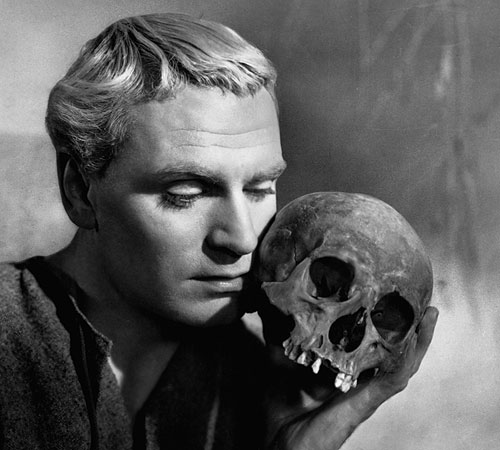 By Act III, Hamlet appears to be slumping into a deep, deep depression. His mind is in a constant war between seeming and being, lies and truth, living and dying. This is first made known in Act I when he speaks about his mother and his uncle, during which he confesses how he wished "the Everlasting had not fixed / His canon 'gainst self-slaughter" (I.ii.135-136).
By Act III, Hamlet appears to be slumping into a deep, deep depression. His mind is in a constant war between seeming and being, lies and truth, living and dying. This is first made known in Act I when he speaks about his mother and his uncle, during which he confesses how he wished "the Everlasting had not fixed / His canon 'gainst self-slaughter" (I.ii.135-136).Through his speech in Act III, Hamlet is troubled with the thoughts that rage within his mind. He contemplates the nobility behind allowing the "mind to suffer" (III.i.65) or to oppose the "sea of troubles" (III.i.67) and put an end to them.
If he allows his mind to suffer, then Hamlet would be keeping quiet about his uncle and allowing this story to torment him. However, this makes Hamlet question himself as a man, asking "Am I a coward?" (II.ii.598). Therefore, by keeping his mouth shut and torturing himself in his own thoughts, he would be accepting his cowardice. However, the nobility behind this would be from dealing with his father's vengeance in his own way; he finds it his duty to seek revenge on his father's murder, although he does express anger that "ever [he] was born to set it right" (I.v.211).
Should Hamlet display opposition against his uncle's cruelties, he would be able to obtain revenge for his father's murder. The nobility, therefore, is achieved through fulfilling his father's wishes and his obligation towards the King. This involves voicing the truth concerning his father's death, however, which is an issue with which Hamlet has always encountered. Before he knew about the King's murder, he refused to voice his opinions about uncle's marriage to the Queen, and despite knowing that "it is not, nor it cannot come to good" (I.ii.163), he holds his tongue.
In addition to the struggle between speaking and keeping quiet, Hamlet also suffers between the dream of dying and the torment of living.
According to Hamlet, dying would end "the heartache and the thousand natural shocks" (III.i.70) that arise from living. He compares dying to sleeping, and "to sleep, perchance to dream" (III.i.73). For him, dying would fulfill his desire of escaping the grief of his father's death, the sins of his uncle and mother, and the pain of keeping all of this to himself. However, what Hamlet fears is the afterlife: a realm unknown to men except to those who can no longer speak, an "undiscovered country from whose bourn / No traveler returns" (III.i.87-88). This lack of knowledge scares him more than the abundant amount of knowledge he's been given, thus convincing him to live through his suffering.
Hamlet's battle within himself continues throughout the play as he has to make his own decisions of right versus wrong.
No comments:
Post a Comment